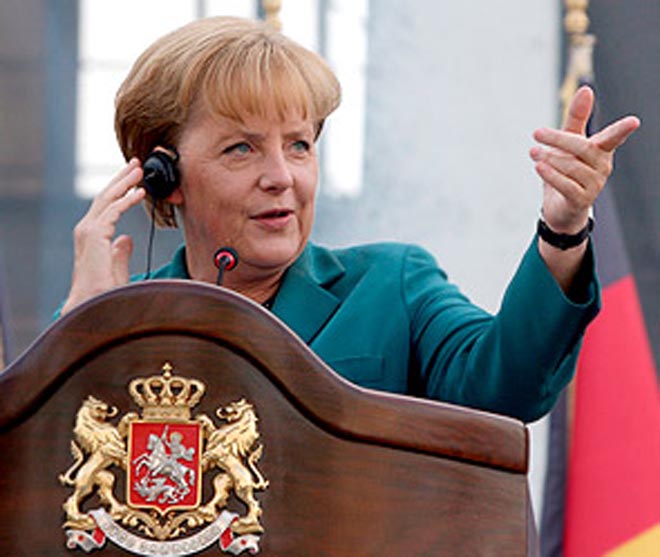German Chancellor Angela Merkel signalled on Saturday that she was willing to expand Turkey's accession talks with the European Union, during a visit by Turkish Prime Minister Tayyip Erdogan, reported dpa.
"We will talk about opening further chapters (of the accession talks)," Merkel said after meeting Erdogan, in reference to the 33 areas in which Turkey has to bring its laws into line with EU regulations.
So far, just 13 of these so-called "chapters" have been opened to negotiation, and the EU has frozen eight more until Turkey opens its ports to Cypriot vessels.
France, along with Cyprus, has opposed opening further chapters, ruling out negotiations at present in all but three areas.
Germany officially espouses a "privileged partnership" for Turkey but says negotiations must not preclude any outcome. Ankara has insisted that the country's goal is full EU membership.
Erdogan stressed that the EU must keep its promises to Turkey and asked Merkel to continue her support of the accession talks.
"There can be no slowing down of this process," the Turkish premier said. He also called for German support to ease visa restrictions between Turkey and the EU.
Merkel said she would also visit Cyprus in January, and see if Germany could play a role in resolving difficulties, stressing that this was also important for the EU's security cooperation with NATO.
"We are also clearly telling Cyprus that this is on the agenda, and both sides need to move," Merkel said.
The leaders met over breakfast after the previous night's Euro 2012 football qualifying match in Berlin, in which Germany beat Turkey 3-0.
Turkey accounts for Germany's largest ethnic minority and most of the country's 4 million Muslims, after a guest worker programme in then-West Germany encouraged economic migration in the 1960s-70s.
Merkel said next year's 50th anniversary of the guest worker scheme would be marked with festivities as well as critical debate over Muslim integration, and invited Erdogan to attend celebrations in October 2011.
In 2008, Erdogan stoked controversy during a speech to ethnic Turks in the German city of Cologne, at which he said "assimilation is a crime against humanity," and told people not to neglect their Turkish language.
Asked on Saturday whether he still held these views, Erdogan said, "Forced (assimilation) is by all means a crime against humanity - in that respect my opinion has not changed.
"In the case of integration, it is about paying respect to the way of life and the values of the society you are living in, and live together and adapt to that society. That is extremely important," Erdogan said.
"Assimilation is not an issue," Merkel added. "This is about integration, the acceptance of our laws and constitution, learning the German language and, in particular creating equal chances for people of Turkish origin.
"The key is language, upbringing and participation in society," the German chancellor said, adding that there was room for improvement.
Erdogan said he highly respected German President Christian Wulff for stating last week that Islam "belonged" to Germany, in a speech that generated public outcry and political debate.
"I cannot say that there is no Christianity in Turkey, or that Judaism is not a reality in my country," Erdogan said, praising Wulff for likewise adressing a reality in Germany.
The previous night, Merkel and Erdogan sat together in the stadium watching the Euro 2012 qualifying match, dubbed as a home game for Turkey as their fans filled almost 40,000 of the 75,000 seats in the Berlin stadium.
Germany in favour of expanding Turkish EU accession talks
German Chancellor Angela Merkel signalled on Saturday that she was willing to expand Turkey's accession talks with the European Union, during a visit by Turkish Prime Minister Tayyip Erdogan, reported dpa.






